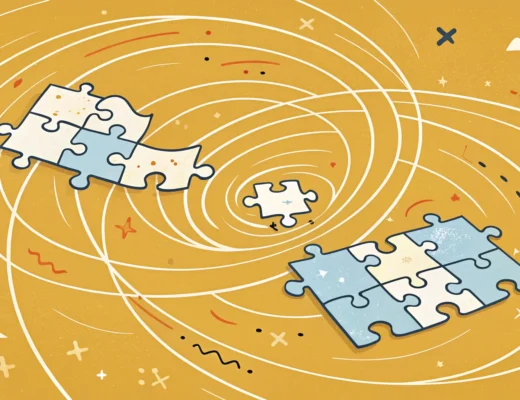One of the biggest struggles millennials face is wading through the information overload to figure out what we should be doing with our time.
Can you really blame us?
Every time you look at your phone, dozens of pings, notifications and alerts flood the screen.
All of them seem urgent. All of them could be important.
So we spend entire days, weeks, months approaching these conflicting demands without any specific prioritization.
Like a grocery list, we throw items into our basket, check them off the list and hope we didn’t forget anything.
The goal is to cut through all the distractions and only work on the core items that will actually move your life forward.
How to determine what you should spend your time on
If you take nothing else from this article, remember this: Your life is not a grocery list. You shouldn’t just seek to “check off” your to-do’s and call it a day.
Your day is not a collection of random tasks. Not everything on your plate holds equal importance — and that means many seemingly “urgent” items may need to fall by the wayside while you work on the small number of objectives that really matter.
Once you really understand this concept at a core level, life gets a LOT simpler.
More often than not, beginning entrepreneurs confuse “motion” with progress and work on things that don’t move the needle. They do things to make themselves “feel” productive and accomplished.
For example:
- Opening a business checking account the first week — with no money to put into it…but it’s nice to have that debit card. It feels official, right?
- Starting Twitter and Facebook accounts — gotta have a “presence” on social media. Bonus points if you go on some shady website and buy 3,000 robot fans from India.
- Agonizing for weeks/months over domain names, brand names or logos — because you read an article in Fast Company about the importance of branding.
- Ordering 2,000 business cards — with the logo that you agonized over…then after you pass out 12, realizing that you actually hate them. The cards sit on the top shelf of your closet until you move.
- Creating an LLC, S-corp, etc — you know…for tax purposes…
None of these make a damn bit of difference in the beginning. And trust me, I’m laughing as I write this because I’ve done ALL of them. It took me years to realize that I was really doing them to inflate my own ego and sense of accomplishment, all the while, actually avoiding meaningful work.
So what types of things deserve your time and attention?
If you’re starting a business, your main focus should be anything that makes money or leads directly to making money.
That’s it.
This might include things like:
- Setting up meetings with potential customers
- Making cold calls, knocking on doors or sending inquiries via email
- Working your referral network of friends, family and colleagues to find people who need your products/services
- Creating content designed to attract your ideal customers
- Doing client work
These are the HARD things. They are uncomfortable. They’re not flashy.
But they make money. And you don’t need to do them a million times to start seeing results.
There will be tons of other things that pop up in your day. Emails will flood in, distractions will arise and other objectives will creep onto your list of priorities.
That’s fine — add those things to the list. But never forget that you only have a limited amount of time each day to get things done.
Focus on things that result in you getting paid.
For instance, yesterday I did a brain dump into my notebook and these were the objectives I came up with for the day:
- Work on book edits, for 3 hours uninterrupted
- Follow up with editors (5 different online publications)
- Get lunch with friend in town
- Email back tribe member
- Add widget back to the website
- Get Facebook ads sorted
- Plan out new product’s shooting schedule with Rich20 team
It’s tempting to write this list down and immediately start hacking away at it like a shopping list.
But that’s not the smartest approach.
If I look at it, I can see that some items are money makers — so they need to come first. Others take more mental energy — they need to happen at the beginning of the day, while I’m fresh. Some are just things I want to do, but won’t really move me forward, per se.
Let’s say I re-did the list based on what’s actually important.
The new list would look like this:
- Work on book edits, for 3 hours uninterrupted
- Plan out new product’s shooting schedule with Rich20 team
- Get Facebook ads sorted
- Follow up with editors
- Get lunch with friend in town
- Email back tribe member
- Add widget back to the website
Notice now that the three things directly related to making income are now prioritized first, followed by the most intellectually challenging items, followed by the more rote tasks.
Now, this list is set up so that even if I only finish HALF of the items, the most important things are taken care of.
This is the level of prioritization that you should design your days with — so that even during an “off” day, you’re still making progress.
Once you’ve learned how to think about your day and determine which things are truly important, it’s time to make your list of priorities even smaller.
Getting ruthless with your priorities by shrinking your list
Remember this: Simple to-do lists are powerful. Long to-do lists are DISEMPOWERING.
Once you’ve prioritized your list according to what actually moves the needle, I want you to cut that list in half.
Why?
The reasons for this are both pragmatic and psychological.
Using the to-do list from above, think about what’s going on in the background.
If I start with this list, and I am only able to work through about half (which is pretty typical any given day) it looks like this
(bold means completed):
- Write my book, for 3 hours uninterrupted
- Plan out new product’s shooting schedule with Rich20 team
- Get Facebook ads sorted
- Follow up with editors (fail)
- Get lunch with friend in town
- Email back tribe member (fail)
- Add widget back to the website (fail)
I got some major things done. That’s solid work! But looking at this list in it’s current state, I FEEL bad about my own progress. because I’ve done less than half of what I intended to accomplish for the day.
Psychologically, this is defeating.
If I make long lists like this day after day and never finish, I’ll always feel behind. I’ll always feel unaccomplished.
But what if we chopped this list in half?
I feel SO much better about this list, even though it’s the exact same one as before:
- Write my book, for 3 hours uninterrupted
- Plan out new product’s shooting schedule with Rich20 team
- Get lunch with friend in town
(Since I have to see my friend, I re-prioritized my list a second time.)
This is a fully completed to-do list.
This is a successful day.
This is something I can build on.
Now I know exactly what’s on tap for tomorrow.
And if I get to items 5-7 today, it actually feels like a BONUS,
Think about it this way: whether you accomplish 3 out of 7 things of the day…or 3 out of 3….you’re still completing the SAME amount of work — but one list leaves you feeling empty and dissatisfied, while the other leaves you confident and happy with your daily progress.
You actually got more done by getting less done.
BOOM.
Related Post:
4 Reasons You Are Actually Killing it As An Entrepreneur







